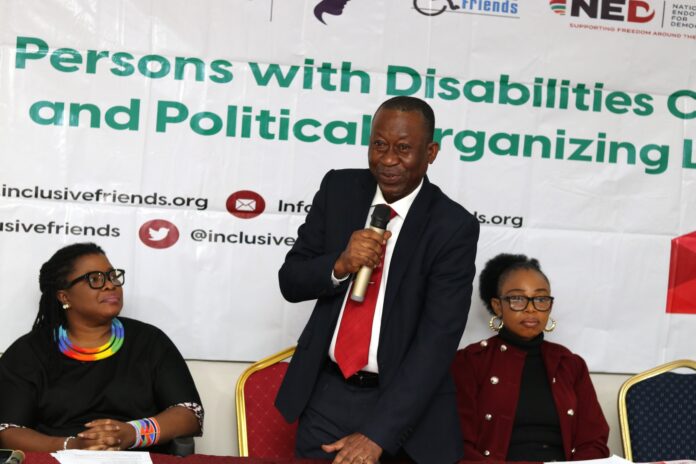By Luminous Jannamike, Abuj
The Independent National Electoral Commision, on Tuesday, disclosed that over 70 per cent of people who registered in the just-concluded Continuous Voters Registration exercise for the 2023 election were vulnerable groups in Nigeria including Persons With Disabilities.
It, therefore, called on political parties, as key drivers of the democratic process and governance in Nigeria, to take the lead in encouraging the full participation of PWDs in their processes, procedures and activities.
INEC National Commissioner and chairman of its Outreach and Partnership Committee, Prof. Kunle Ajayi, stated these while speaking at the National PWD Civic and Political Lab, in Abuja.
The event was organized by a human rights organisation – Inclusive Friends Association (IFA) with support from Participate Today and National Endowment for Democracy.
Delivering the keynote address titled, ‘The role of political parties in engendering inclusive Democratic governance in Nigeria’, Ajayi cited data from the National Population Commission which indicated that there are, at least, 19 million Nigerians who are with disabilities.
According to him, “From our own records, many of the PWDs are registered voters who could be mobilized in favour of any inclusive party. This implies that, PWDs have a strong electoral strength.
“Recent inclusivity data from INEC in relation to the just-concluded Continuous Voters Registration exercise reflect that the vulnerable groups comprising of women, youths, PWDs and IDPs, made up over 70 per cent of the registrants. With this impressive percentage, they cannot simply be ignored in the electoral process.
“Consequently, when political parties take on the mantle of ensuring inclusive mainstreaming and prioritise the principle of Inclusion in the administration of party affairs, we would begin to see more people from the marginalised groups along with women and youths taking on more executive, political and leadership roles at all levels.
“Also, vulnerable groups should be given specific quotas in governments at all levels. These actions will help build and maintain a broader base of constituent support and earn citizens trust and believe in democratic governance.”
According to him, INEC has launched the framework on access and participation of persons with disabilities in the electoral process.
“Beyond that, a new Department of Gender and Inclusivity headed by a female Director was established after the 2019 heneral elections. On top of that, with a database of over 84,000 PWDs on INEC register, the commission is making every effort to provide for their specific assistive needs.
“Working with political parties, the commission has also encouraged them to create PWDs Desk in all party offices nationwide”, the INEC National Commisioner stated.
Also speaking, the Executive Director of IFA, Grace Jerry, outlined what political parties should do to ensure inclusion in the 2023 electioneering process.
She said, “All political parties must work to ensure that the code of conduct for political parties should provide very clear measures to administratively review political party provisions for all PWDs in various political parties; therefore, a clear policy direction on inclusion is required from political parties
“Political parties should deliberate about the production of their campaign materials to ensure they are inaccessible formats to reach different clusters of PWDs. For instance, braille forms, audio, sign language/subtitled videos, etc.
“Political parties should ensure that venues for meetings and campaign activities are accessible to all PWDs. This oversight function of the political parties can be facilitated through the National Assembly.”
Jerry called on CSOs to also advocate for the rights of all persons in the political and electoral spaces irrespective of gender, disability, and age.
“The inclusion of youth and gender parity must be mainstream in all our programs to close the gaps and exclusion at all levels,” she emphasized.


